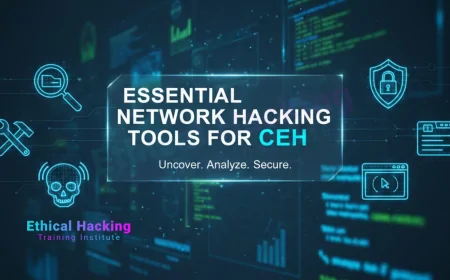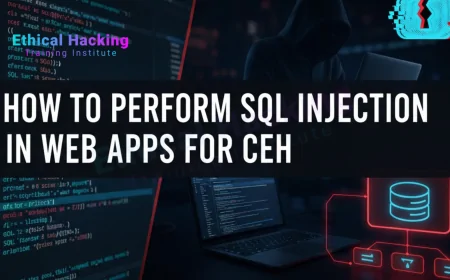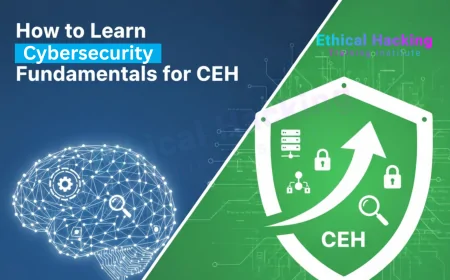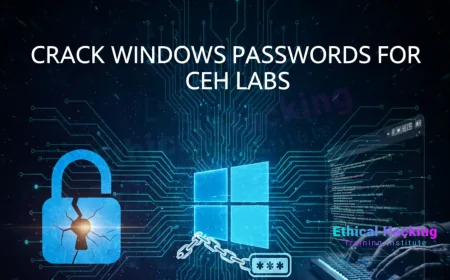Ethical Hacking Certification Training: How to Get Certified and Start Your Career in Cybersecurity | Beginner’s Guide to Ethical Hacking Training and Cybersecurity Careers
Discover the top ethical hacking certification training paths in 2025. Learn how to get certified and launch your career in cybersecurity today.
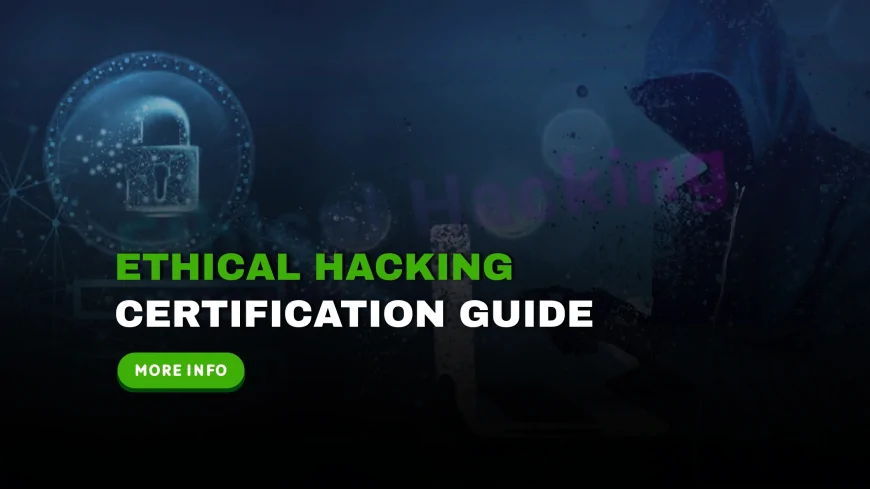
Table of Contents
- Introduction
- Why Ethical Hacking Certification Matters in 2025
- Top Ethical Hacking Certifications
- CEH – Certified Ethical Hacker
- OSCP – Offensive Security Certified Professional
- CompTIA PenTest+
- eMAPT – eLearnSecurity Mobile App Pentester
- OSCE – Offensive Security Certified Expert
- How to Prepare: Training, Labs & Study Plan
- Key Skills You'll Master
- Training & Exam Costs
- Career Opportunities & Salary Outlook
- Course & Cert Comparison Table
- Best Practices for Success
- Frequently Asked Questions (FAQs)
- Conclusion
Introduction
Ethical hacking—also known as penetration testing or white-hat hacking—focuses on identifying and fixing security vulnerabilities. In 2025, this discipline remains vital to protecting systems, data, and businesses from rising digital threats. Certification ensures standardized knowledge, practical abilities, and credibility in the job market. This guide outlines the best certification paths, preparation strategies, job outcomes, and expert tips to help you begin your cybersecurity career effectively.
Why Ethical Hacking Certification Matters in 2025
- Industry recognition: Certifications from EC‑Council, Offensive Security, CompTIA, and eLearnSecurity are trusted globally.
- Hands-on validation: Employers value proof of practical skills via labs and real-world assessments.
- Career growth: Certified professionals often see double-digit salary increases and faster promotions.
- Diverse roles: Opens opportunities in pentesting, red teaming, bug bounty, mobile security, and consultative roles.
Top Ethical Hacking Certifications
1. CEH – Certified Ethical Hacker
Offered by EC‑Council, CEH is a foundational cert covering network, web, mobile, and cloud hacking techniques. CEH v13 includes modern content like IoT, AI-based attacks, and MITRE ATT&CK strategies. Candidates need 40–60 hours of training or 2 years of experience. The exam has 125 MCQs in 4 hours. Optional CEH Practical exam offers a 6-hour, 20-challenge lab-based test.
2. OSCP – Offensive Security Certified Professional
Hosted by Offensive Security, OSCP is the industry-leading practical penetration testing certification. The self-paced kit includes video lessons, a lab VPN, and a 24‑hour exam where candidates must compromise multiple systems and produce a detailed report. OSCP demands commitment—a typical prep time is 3–6 months of lab work.
3. CompTIA PenTest+
CompTIA PenTest+ certifies intermediate penetration testing skills. It covers scanning, exploitation, vulnerability reporting, and communication. The exam mixes performance-based and multiple-choice questions. No prerequisites, but Security+ or equivalent experience is recommended.
4. eMAPT – eLearnSecurity Mobile App Pentester
eMAPT focuses on mobile security, especially Android and iOS apps. It includes APK analysis, reverse engineering, OWASP Mobile Top 10, and dynamic instrumentation. The exam is a proctored lab environment with real-world challenges.
5. OSCE – Offensive Security Certified Expert
OSCE is an advanced post-OSCP cert designed for exploit developers and penetration testers. It covers exploit writing, shellcode, advanced web attacks, and undocumented vulnerabilities. The exam is practical, open-book, and timed.
How to Prepare: Training, Labs & Study Plan
- Choose your path: CEH is ideal for beginners; OSCP and OSCE demand more depth and are suited for professionals.
- Select training: Choose from accredited instructor-led classes or self-study via platforms like TryHackMe, Hack The Box, or Offensive Security.
- Set up a lab: Use Kali Linux, virtualization (VirtualBox/VMware), cloud labs, and CTF platforms for hands-on exercises.
- Study schedule: Dedicate 10–15 hours weekly; CEH typically needs 2–3 months, OSCP requires 4–6 months.
- Practice reports: Learn to write professional penetration testing documents—an OSCP requirement.
- Peer learning: Join Discord groups, Slack channels, and forums to discuss challenges and share tips.
Key Skills You'll Master
- Footprinting and reconnaissance using tools like Nmap, Netcat, and Shodan
- Vulnerability assessment with Nessus or OpenVAS
- Exploitation using Metasploit and custom scripting
- Privilege escalation on Windows and Linux
- Web app hacking (SQLi, XSS, CSRF, IDOR)
- Wireless and network protocol exploits
- Scripting in Python, Bash, PowerShell
- Reporting with professional documentation and remediation advice
Training & Exam Costs
| Certification | Training Cost | Exam Fee | Total Estimated |
|---|---|---|---|
| CEH | ₹50,000–₹80,000 | ₹21,000 | ₹70,000–₹100,000+ |
| OSCP | ₹60,000–₹120,000 | ₹50,000 | ₹110,000–₹170,000 |
| PenTest+ | ₹20,000–₹30,000 | ₹18,000 | ₹38,000–₹48,000 |
| eMAPT | ₹30,000–₹60,000 | ₹30,000 | ₹60,000–₹90,000 |
| OSCE | ₹80,000–₹150,000 | ₹75,000 | ₹155,000–₹225,000 |
Career Opportunities & Salary Outlook
- Penetration Tester: ₹8–20 LPA for juniors, ₹25–50+ LPA for experienced professionals
- Red Team Engineer: ₹12–30 LPA mid-career, ₹35–60+ LPA for experts
- Security Consultant: ₹10–25 LPA
- Bug Bounty Hunter: ₹0.5–10 LPA+ (based on findings)
- Mobile App Security Engineer: ₹10–30 LPA with eMAPT
- Exploit Developer: ₹20–40 LPA+
Course & Cert Comparison Table
| Cert | Level | Focus | Hands-on | Prerequisite |
|---|---|---|---|---|
| CEH | Foundation | Networking, web, mobile, cloud | Medium | None or 2 yrs exp |
| OSCP | Advanced | Pen Testing, reporting | High | Basic pentest skills |
| PenTest+ | Intermediate | Network/app pentest | Medium | Security+ |
| eMAPT | Pro | Mobile apps | High | None |
| OSCE | Expert | Exploit dev | Very High | OSCP |
Best Practices for Success
- Create a home lab environment with multiple VM servers and networking setups.
- Practice CTFs and bug bounty challenges regularly.
- Document everything: write detailed reports and maintain a portfolio.
- Engage with communities: Discord, Slack, Reddit r/netsec, r/ethicalhacking.
- Stay updated with CVEs, security blogs (e.g., KrebsOnSecurity), and conferences.
Frequently Asked Questions (FAQs)
1. What is the best ethical hacking certification to start with?
CEH is ideal for beginners, offering broad coverage. PenTest+ is also beginner-friendly. OSCP suits those with foundational skills aiming for depth.
2. Do I need prior experience before taking CEH?
No experience is required if you complete training. Alternatively, 2 years of IT/security experience qualifies you directly.
3. Is OSCP harder than CEH?
Yes, OSCP is much more practical and demanding. You'll need strong hands-on skills, lab dedication, and report-writing capability.
4. How long does it take to get certified?
CEH: 2–3 months; PenTest+/eMAPT: 2–4 months; OSCP: 4–6 months; OSCE: 6–9 months.
5. How much does certification cost?
Costs vary: CEH ₹70–100k; PenTest+ ₹38–48k; OSCP ₹110–170k; eMAPT ₹60–90k; OSCE ₹155–225k.
6. Are paid trainings necessary?
Instructor training helps but self-study with online platforms and labs is sufficient for many.
7. What topics are covered in CEH?
CEH covers reconnaissance, scanning, exploitation, malware, web/mobile/cloud, packet sniffing, wireless, IDS evasion, and more.
8. Can I do multiple certifications simultaneously?
Yes, but only if you can dedicate sufficient time. Start with one and progress sequentially for depth.
9. Do these certifications expire?
CEH, OSCP, PenTest+, eMAPT, and OSCE are valid for 3 years. Renewal involves continuing education or retakes.
10. Is scripting essential?
Yes—knowledge of Python, Bash, and PowerShell scripts enhances tool usage and automation capability.
11. Do I need to write reports in exams?
Yes, report-writing is part of OSCP and OSCE, and valued by employers for all certifications.
12. What labs should I use?
Kali Linux, TryHackMe, Hack The Box, Offensive Security labs, and cloud VMs are all great options.
13. Can I freelance after certification?
Yes—pentesting, red teaming, bug bounty, and consulting are viable freelance paths once certified.
14. Are certifications recognized globally?
Yes—all listed certifications are internationally recognized and valued across industries.
15. Which certification pays the most?
OSCE and OSCP holders often command higher salaries due to advanced practical expertise, but experience also plays a key role.
16. Is mobile app security worth pursuing?
Yes—mobile attacks are increasing. eMAPT positions you well for specialized roles in mobile security.
17. Are virtual courses as effective as classroom?
Yes, as long as they include quality training, labs, and instructor or community support.
18. How do I maintain certification?
Earn continuing education credits or renew periodically per certification requirements.
19. Where can I find mentors?
Security forums, CTF Discord servers, GitHub, professional groups (LinkedIn), and local meetups can connect you with mentors.
20. What should I do after certification?
Build a CTF portfolio, apply for internship/jobs, freelance on bug platforms, and pursue higher-level certs like OSCP/OSCE.
Conclusion
Ethical hacking certifications offer a structured path to enter and grow in cybersecurity. From foundational credentials like CEH to advanced programs like OSCP, PenTest+, eMAPT, and OSCE, there are clear steps to suit your career goals. Practical training, consistent study, peer engagement, and documentation build confidence and expertise. Begin today—your future in cybersecurity awaits.
What's Your Reaction?
 Like
0
Like
0
 Dislike
0
Dislike
0
 Love
0
Love
0
 Funny
0
Funny
0
 Angry
0
Angry
0
 Sad
0
Sad
0
 Wow
0
Wow
0






